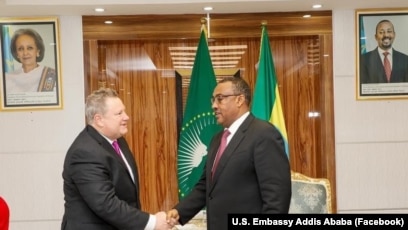Ethiopia’s finance minister has announced that the economy is projected to expand by 8.9 % in the fiscal year beginning 8 July 2025, alongside a modest increase in the budget deficit amid structural reforms.
Finance Minister Ahmed Shide addressed parliament on Tuesday, outlining the forecast for the next fiscal year, citing an acceleration in real GDP growth from an estimated 8.4 % this year to 8.9 % next year. The state budget deficit is expected to rise slightly to 2.2 % of GDP, compared to 2.1 % in the current year. Total government expenditure is projected at 1.9 trillion birr, equivalent to around US $14 billion.
This positive outlook is deeply anchored in ongoing reforms backed by an International Monetary Fund programme. These include the liberalisation of the exchange rate, debt restructuring negotiations, and the establishment of the Ethiopian Securities Exchange, which opened in January after a 50‑year absence.
The cabinet’s approval of the new budget earlier this month signalled a strategic reallocation of resources, with spending set to increase by 31 % compared to the previous year’s 971 billion birr. A significant portion is earmarked for national security, productivity enhancement, and disaster relief, including continued subsidies for fuel, fertiliser, oil and medicines—a move aimed at dampening inflationary pressure on households.
Reforms and their impacts
The IMF programme that began in July 2024 has been a linchpin in the reform agenda. In April, State Finance Minister Eyob Tekalign reported that the third review of the four‑year US $3.4 billion loan arrangement had reached staff‑level agreement, with approval by the IMF executive board anticipated this month. Subsequent draws will hinge on continued reform progress, notably debt restructuring.
Debt, inflation and exchange rate liberalisation remain pressing concerns. A draft budget revealed that 463 billion birr—nearly 39 % of recurrent expenditure—will go towards debt servicing, surpassing planned capital outlays. The government intends to restructure approximately US $3.5 billion in external liabilities through agreements in upcoming weeks. Bondholder writedowns are expected as part of a broader debt resolution strategy.
Monetary reforms have lessened inflation, which reached 29.2 % in 2022/23, and narrowed the spread between official and parallel exchange rates. Foreign reserves have rebounded, tripling to US $3.6 billion, easing foreign exchange shortages. These financial indicators have been central in IMF assessments.
Policy makers are awaiting formal debt restructuring talks this summer with official and private creditors alike, guided by the G20 Common Framework. Iran‑timed agreements with Chinese policy banks, the U.S. International Development Finance Corporation and other funders are being explored to support infrastructure and development needs.
Regional comparisons and strategic outlook
Ethiopia remains one of sub‑Saharan Africa’s highest growth economies, although still below the pre‑covid annual average of around 10 %. The country’s trajectory continues to be shaped by recovery from the Tigray war, covid‑19 disruptions, droughts and locust invasions, but ongoing reforms are expected to unlock further expansion.
The imminent fiscal year budget, combining a steep rise in expenditure with a stabilising deficit, underscores a cautious but ambitious strategy: focusing on debt management, reform momentum and public service delivery, rather than unfettered spending.
Key stakeholders, including opposition figures such as Desalegn Chane of the National Movement of Amhara, have voiced concern over rising tax burdens amid steady living costs and a depreciating birr. Criticism has targeted new levies on motor vehicles and excise taxes, with claims these conflict with subsidy policies. The finance minister, however, defended these as necessary for fiscal resilience and revenue expansion.
Broader reform dynamics have been influenced by Prime Minister Abiy Ahmed’s economic agenda, including the launch of Ethiopia’s first stock market since the Haile Selassie era, currency liberalisation, and opening the banking sector to foreign investment. These steps have been deemed essential to securing up to US $27 billion in external funding from IMF, World Bank, UAE, China and others over the next four years.
Looking ahead
The projection of roughly 8.9 % GDP growth signals confidence that reforms are gaining traction, even as the government prepares to finance a wider budget and service rising debt. The success of the IMF programme’s next review, debt restructuring outcomes, and reform implementation will determine whether Ethiopia can sustain its economic momentum and weather domestic and global headwinds.

